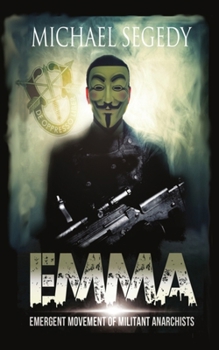EMMA: Emergent Movement of Militant Anarchists
EMMA focuses primarily on young hacktivists who were once members of the internet freedom fighters group Anonymous. One of them, an ex-black ops officer, joins the militant group of anarchists to right a terrible wrong. Although the group is committed to social change, they believe real change must be precipitated by acts of violence. But not random acts of violence. They target the CEOs of major corporations responsible for crimes against humanity, convinced that the power elite will listen only when they are forced to live in a state of terror.
Although the novel highlights the life of a former black ops officer turned terrorist, this is not the story of a renegade NCS commando gone bonkers. Rather it tells of a young man, Brent Cossack, accepted into Georgetown University, who decides to forgo college and join the military. As a CIA operative in Iraq, he discovers an ugly truth about US involvement there, and he decides to resign. He returns home and falls in love with a beautiful political activist. Everything seems just swell, until a terrible event in his life pushes him over the edge.
FBI agent Rick Clark, the other principal character in the novel, finds himself in the middle of an investigation that forces him to relive the saddest time in his life--the tragic death of his daughter in a terrorist bombing. Since his divorce, he has lived alone, avoiding relationships, except those established at work out of necessity. That is, until he meets Marty Robin.
Robins, a psychologist involved in the investigation, gradually helps resuscitate life into Rick, while more hope comes later in the form of an unexpected hero that restores meaning to his fragmented life.
EMMA is the kind of novel that appeals to readers who enjoy thoughtful, action-packed crime thrillers. It is a novel with political undertones, social commentary, and loveable as well as odious characters. It's also a novel about love and loss and an indictment of a democratic society that seems to become less so each day.





